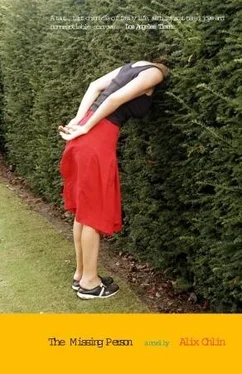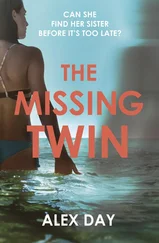Wylie pulled into a rest area toward the bottom of the crest road and parked, Stan and Berto promptly emerging from the trees with their bicycles. Irina unclipped their front wheels and started stowing them away in the trunk, so I helped her as the men walked off into the forest. When we locked the car and followed, I could hear rustling and voices but couldn’t see a thing. Then Irina pressed a flashlight into my hand. “I’m going to wait here in the car until you come back,” she said.
“Where am I going?”
“They have something to show you,” she said.
By the anemic light I could make out four silhouettes far ahead of us. I beamed it directly on Wylie, who looked back at me, startled and wide-eyed as a deer.
“Don’t do that,” he said.
I hurried toward them, but Wylie was gone — his disappearance nearly instant and complete. I stood still, breathing hard, beaming the flashlight around until it lit on Angus, who was leaning against a tree trunk, watching me stumble around.
“How are you with small spaces?” he said.
“Tell me what’s going on.”
He was next to me then, taking the flashlight out of my hand and inserting his own hot, dry palm instead. He pointed the beam at a boulder ten steps in front of us, and I could see a hole in the ground with fresh dirt at the edges. “Down,” he said. “About six feet. Then you’ll walk a few steps, then go down again. I’ll be right behind you.”
“You have got to be kidding.”
He laughed. “Your lack of courage is very honest.” Then he pushed me forward.
Just below the lip of the entrance I could feel a horizontal bar, the top rung of a ladder.
“Don’t bother looking down,” Angus said, switching off the flashlight. For some reason I closed my eyes, as if that would be more comforting than the darkness of the forest.
“Six steps,” he said. “Then dirt.”
He was right. At the bottom of the ladder I stepped away and he came down after me, then we went farther down and moved along a cramped dirt tunnel into a space large enough to stand up in. A propane lamp sat on the open seat of a folding chair, Stan and Berto on the ground next to it, giggling and drinking beer. The air was cool and oddly fresh, fragrant with earth.
It was a room of dirt. Lining the walls were plastic bottles, dried food in pouches, garbage bags, and a bulletin board with a diagram of the tunnel system and a small Chamber of Commerce poster. A red sun was setting over a brown, cracked landscape below cursive blue lettering: SPEND THE SUMMER IN BISBEE, ARIZONA.
Wylie came in from some other tunnel and stared as if challenging me to say something, which I didn’t. I could tell that he was proud of what they’d done, and it was pretty amazing, their little fort.
“We’ve got enough food and water,” he said, “for four of us to last two weeks.”
“Would you really stay here that long?”
“As long as it takes.”
“Takes to do what?”
“Make a point,” Wylie said. Berto muttered, “Excuse me”—to me apparently — and picked up an empty plastic bottle, then ducked out of sight into one of the tunnels.
“You can stay if you want,” Wylie went on, “but you’ll have to bring your own supplies. You can take Irina and Psyche back in the Caprice, and be back before the walls go up.”
“You’re welcome to stay,” Angus put in. “But we thought you should see the place before you made your decision.”
“What walls?” I said.
“We’re barricading the road,” Wylie said. “To make the refuge. Weren’t you listening to my position paper?”
I sat down on the ground next to Angus, who touched my knee gently, in a gesture of either encouragement or concern, I couldn’t tell which.
Berto reappeared, sloshing his plastic jug. “We’re going totally feral down here, man,” he said.
“Except for the beer,” I pointed out.
“Nobody ever said beer and ecology are incompatible,” Angus said cheerfully.
“How do you—” I said.
“The bottles are for pissing,” Wylie said, “obviously. There’s a funnel setup girls can use. Women, I mean. There’s plastic bags and toilet paper for the other business. It’s two weeks, Lynnie. Not the rest of your life.”
I couldn’t remember the last time I’d heard him use my name. He was waiting for me to answer, and I wanted to prove to him — to all of them — that I could make it. That they could survive down here impressed me as much as the space itself. But the smell of dirt all around me turned from fresh to rancid, and I thought about worms in my hair and the stench of shit in plastic bags. I imagined the tunnels collapsing, and couldn’t breathe. “I’m sorry,” I said, “but there’s no way.”
My brother nodded, as if he’d known all along that this would be my response.
Angus stood up, and he didn’t look particularly surprised, either. “I’ll take you up,” he said.
Berto and Stan didn’t even wave.
It was two o’clock in the morning when I pulled into my mother’s driveway. I was about to unlock the front door when David Michaelson opened it.
“Well, if it isn’t the coal miner’s daughter,” he said, smiling broadly.
I didn’t smile back. “Excuse me,” I said, pushing past him.
My mother was sitting on the couch by the television in a light-blue bathrobe, a mug of what looked like warm milk cradled on her lap. “You’re back,” she said.
“What are you doing up?”
“I haven’t been sleeping well,” she said. Her tone was so extremely neutral as to make it even more laden with reproach. “We were watching a late movie.”
On the TV, Frank Sinatra was sweating horribly in black and white, and I thought of his sweet sounds playing in Wylie’s car, Angus beside me, singing along. But here, in The Manchurian Candidate, Frank was drunk. Raymond Shaw, the angular, government-programmed assassin, was also drunk, and waxing nostalgic. “I used to be lovable,” he was telling Sinatra. “You wouldn’t believe how lovable I used to be.”
“This is a good movie,” I said, and my mother nodded.
“The days were lovable, the nights were lovable, everybody was lovable,” Raymond Shaw said bitterly. He was recalling an innocent and happy summer of his youth, a time that was sunny and irretrievable, and I thought I knew how he felt.
My mother patted the couch beside her. David was still lingering somewhere behind me, waiting, I guessed, to see what I’d do. “Have a seat,” she said in the same weirdly neutral tone. “Tell me what you’ve been up to.”
I shook my head, gesturing down at myself. There was no way I could sit down next to her, in her clean bathrobe, on that clean couch. “I’d better take a shower,” I said, “I’m filthy.”
“That you are!” David boomed. When I turned around, he was smiling widely at me. “You’re filthier than an alley cat in a rainstorm.”
“Is that a saying?” I said.
“It is now,” he said, patting my shoulder. “You go wash up, dear.”
I fled the room. In the shower I lathered, rinsed, and repeated, trying to get my hair clean. The smell of my mother’s strawberry shampoo was like candy. I felt like I couldn’t keep going back and forth between these two worlds — from tunnels to strawberry shampoo — without going crazy. I understood, now, why Wylie couldn’t answer my mother’s questions about what he was doing: because it was absurd to be feral in a condo; it was ludicrous; it was damning. Yet the condo itself was absurd, too, its cleanliness and decor almost wilfully oblivious to the real matters of the world. I rubbed conditioner that smelled like almonds into my scalp, and stood in the shower for a long, long time.
When I got out, my skin was loose and puckered, and my mother was standing in my room, going through the clothes on the floor, checking the pockets before dropping them into a laundry basket.
Читать дальше












